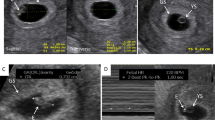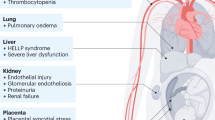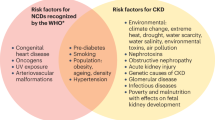Abstract
Perinatal nutritional factors may lead to decreased nephron endowment, decreased kidney function, and long-term development of chronic kidney disease and non-communicable diseases. At the same time, optimal postnatal nutrition and catch-up growth are associated with better neurodevelopmental outcomes in preterm infants. Therefore, nutritional management of preterm infants is a major challenge for neonatologists. In this context, the Section of Nutrition, Gastroenterology and Metabolism reviewed the current knowledge on nutritional issues related to kidney function. This narrative review discusses the clinical impact of early postnatal nutrition on long-term kidney function. In preterm infants, data are largely lacking to determine the extent to which early nutrition contributes to nephrogenesis and nephron endowment. However, some nutritional principles may help clinicians better protect the developing kidney in preterm infants.
Impact
-
Clinical data show that preterm infants are an emerging population at high risk for chronic kidney disease.
-
Both undernutrition and overnutrition can alter long-term kidney function.
-
In preterm infants, data are largely lacking to determine the extent to which early postnatal nutrition contributes to nephrogenesis, nephron endowment and increased risk for chronic kidney disease.
-
Some nutritional principles may help clinicians better protect the developing kidney in preterm infants: avoiding extrauterine growth restriction; providing adequate protein and caloric intakes; limiting exposure to high and prolonged hyperglycaemia; avoiding micronutrient deficiencies and maintaining acid-base and electrolyte balance.
This is a preview of subscription content, access via your institution
Access options
Subscribe to this journal
Receive 14 print issues and online access
$259.00 per year
only $18.50 per issue
Buy this article
- Purchase on Springer Link
- Instant access to full article PDF
Prices may be subject to local taxes which are calculated during checkout
Similar content being viewed by others
References
Juvet, C. et al. Effect of early postnatal nutrition on chronic kidney disease and arterial hypertension in adulthood: a narrative review. J. Dev. Orig. Health Dis. 9, 598–614 (2018).
Luyckx, V. A. & Brenner, B. M. Birth weight, malnutrition and kidney-associated outcomes–a global concern. Nat. Rev. Nephrol. 11, 135–149 (2015).
Chehade, H., Simeoni, U., Guignard, J. P. & Boubred, F. Preterm Birth: Long Term Cardiovascular and Renal Consequences. Curr. Pediatr. Rev. 14, 219–226 (2018).
da Silva Lopes, K. et al. Effects of nutrition interventions during pregnancy on low birth weight: an overview of systematic reviews. BMJ Glob. Health 2, e000389 (2017).
Englund-Ögge, L. et al. Maternal dietary patterns and preterm delivery: results from large prospective cohort study. BMJ 348, g1446 (2014).
Luyckx, V. A. et al. A developmental approach to the prevention of hypertension and kidney disease: a report from the Low Birth Weight and Nephron Number Working Group. Lancet 390, 424–428 (2017).
World Health Organization. Regional Office for Europe. Good maternal nutrition: the best start in life. World Health Organization. Regional Office for Europe. https://apps.who.int/iris/handle/10665/329459, accessed 14th august 2023. (2016)
Lapillonne, A. & Griffin, I. J. Feeding preterm infants today for later metabolic and cardiovascular outcomes. J. Pediatr. 162 S7–S16 (2013).
Rozé, J. C. et al. Association Between Early Amino Acid Intake and Full-Scale IQ at Age 5 Years Among Infants Born at Less Than 30 Weeks’ Gestation. JAMA Netw. Open 4, e2135452 (2021).
Faa, G. et al. Morphogenesis and molecular mechanisms involved in human kidney development. J. Cell Physiol. 227, 257–268 (2012).
Saint-Faust, M., Boubred, F. & Simeoni, U. Renal development and neonatal adaptation. Am. J. Perinatol. 31, 773–780 (2014).
Hughson, M. et al. Glomerular number and size in autopsy kidneys: the relationship to birth weight. Kidney Int. 63(6), 2113–2122 (2003).
Merlet-Bénichou, C. et al. Nephron number: variability is the rule. Causes and consequences. Lab Invest. 79, 515–527 (1999).
Lee, Y. Q., Collins, C. E., Gordon, A., Rae, K. M. & Pringle, K. G. The relationship between maternal nutrition during pregnancy and offspring kidney structure and function in humans: a systematic review. Nutrients 10, 241 (2018).
Wood-Bradley, R. J., Barrand, S., Giot, A. & Armitage, J. A. Understanding the role of maternal diet on kidney development; an opportunity to improve cardiovascular and renal health for future generations. Nutrients 7, 1881–1905 (2015).
Brophy, P. D., Robillard, J. E. Functional development of the kidney in utero. (Polin and Fox ed. Fetal and neonatal physiology. 3th ed. W.B. Saunders Company, pp 1229-1239 2004).
Cargill, K. et al. Von Hippel-Lindau acts as a metabolic switch controlling nephron progenitor differentiation. J. Am. Soc. Nephrol. 30, 1192–1205 (2019).
Popescu, C. R. et al. Hyperoxia exposure impairs nephrogenesis in the neonatal rat: role of HIF-1alpha’. PLoS ONE 8, e82421 (2013).
Rodriguez, M. M., Gomez, A. H. & Abitbol, C. L. Histomorphometric analysis of postnatal glomerulogenesis on extremely preterm infants. Pediatr. Dev. Pathol. 7, 17–25 (2004).
Sutherland, M. R. et al. Accelerated maturation and abnormal morphology in the preterm neonatal kidney. J. Am. Soc. Nephrol. 22, 1365–1374 (2011).
Gubhaju, L. et al. Is nephrogenesis affected by preterm birth? Studies in a non-human primate model. Am. J. Physiol. Ren. Physiol. 297, F1668–F1677 (2009).
Sutherland, M. R. et al. Renal morphology and glomerular capillarisation in young adult sheep born moderately preterm. J. Dev. Orig. Health Dis. 12, 975–981 (2021).
Gao, Q., Lu, C., Tian, X., Zheng, J. & Ding, F. Urine podocyte mRNA loss in preterm infants and related perinatal risk factors. Pediatr. Nephrol. 38, 729–738 (2023).
Ding, F., Gao, Q., Tian, X., Mo, J. & Zheng, J. Increasing urinary podocyte mRNA excretion and progressive podocyte loss in kidney contribute to the high risk of long-term renal disease caused by preterm birth. Sci. Rep. 11, 20650 (2021).
Iacobelli, S. & Guignard, J. P. Maturation of glomerular filtration rate in neonates and infants: an overview. Pediatr. Nephrol. 36, 1439–1446 (2021).
Gubhaju, L. et al. Assessment of renal functional maturation and injury in preterm neonates during the first month of life. Am. J. Physiol. Ren. Physiol. 307, F149–F158 (2014).
Iacobelli, S. & Guignard, J. P. Renal aspects of metabolic acid-base disorders in neonates. Pediatr. Nephrol. 35, 221–228 (2020).
Charlton, J. R., Harer, M. W., Swan, C. & Nielsen, R. Immature megalin expression in the preterm neonatal kidney is associated with urinary loss of vitamin carrier proteins. Pediatr. Res. 85(3), 405–411 (2019).
Schreuder, M. F., Nyengaard, J. R., Remmers, F., van Wijk, J. A. & Delemarre-van de Waal, H. A. Postnatal food restriction in the rat as a model for a low nephron endowment. Am. J. Physiol. Ren. Physiol. 291, F1104–F1107 (2006).
Luzardo, R. et al. Metabolic programming during lactation stimulates renal Na+ transport in the adult offspring due to an early impact on local angiotensin II pathways. PloS one 6, e21232 (2011).
Boubred, F. et al. Effects of early postnatal hypernutrition on nephron number and long-term renal function and structure in rats. Am. J. Physiol. Ren. Physiol. 293, F1944–F1949 (2007).
Luyckx, V. A. et al. Effect of fetal and child health on kidney development and long-term risk of hypertension and kidney disease. Lancet 382, 273–283 (2013).
Boubred, F., et al. Developmental origins of chronic renal disease: an integrative hypothesis. Int. J. Nephrol. https://doi.org/10.1155/2013/346067 (2013).
Wlodek, M. E. et al. Normal lactational environment restores nephron endowment and prevents hypertension after placental restriction in the rat. J. Am. Soc. Nephrol. 18, 1688–1696 (2007).
Siddique, K., Guzman, G. L., Gattineni, J. & Baum, M. Effect of postnatal maternal protein intake on prenatal programming of hypertension. Reprod. Sci. 21, 1499–1507 (2014).
Ko, G. J., Rhee, C. M., Kalantar-Zadeh, K. & Joshi, S. The Effects of High-Protein Diets on Kidney Health and Longevity. J. Am. Soc. Nephrol. 31, 1667–1679 (2020).
Boubred, F. et al. High protein intake in neonatal period induces glomerular hypertrophy and sclerosis in adulthood in rats born with IUGR. Pediatr. Res. 79, 22–26 (2016).
Boubred, F. et al. Neonatal high protein intake enhances neonatal growth without significant adverse renal effects in spontaneous IUGR piglets. Physiol. Rep. 5, e13296 (2017).
Suryawan, A. et al. Activation by insulin and amino acids of signaling components leading to translation initiation in skeletal muscle of neonatal pigs is developmentally regulated. Am. J. Physiol. Endocrinol. Metab. 293, E1597–E1605 (2007).
Davis, T. A., Suryawan, A., Orellana, R. A., Nguyen, H. V. & Fiorotto, M. L. Postnatal ontogeny of skeletal muscle protein synthesis in pigs. J. Anim. Sci. 86, E13–E18 (2008).
Hokke, S. et al. Maternal fat feeding augments offspring nephron endowment in mice. PloS one 11, e0161578 (2016).
Kasper, P. et al. Renal metabolic programming is linked to the dynamic regulation of a Leptin-Klf15 Axis and Akt/AMPKα signaling in male offspring of Obese Dams. Endocrinology 158, 3399–3415 (2017).
Espírito Santo, S. G., Monte, M. G., Polegato, B. F., Barbisan, L. F. & Romualdo, G. R. Protective Effects of Omega-3 Supplementation against Doxorubicin-Induced Deleterious Effects on the Liver and Kidneys of Rats. Molecules 28, 3004 (2023).
Shamseldeen, A. M. et al. Omega-3 attenuates high fat diet-induced kidney injury of female rats and renal programming of their offsprings. Arch. Physiol. Biochem 125, 367–377 (2019).
Armitage, J. A. et al. Increased blood pressure later in life may be associated with perinatal n-3 fatty acid deficiency. Lipids 38, 459–464 (2003).
Amri, K., Freund, N., Vilar, J., Merlet-Bénichou, C. & Lelièvre-Pégorier, M. Adverse effects of hyperglycemia on kidney development in rats: in vivo and in vitro studies. Diabetes 48, 2240–2245 (1999).
Kanwar, Y. S. et al. Hyperglycemia: its imminent effects on mammalian nephrogenesis. Pediatr. Nephrol. 20, 858–866 (2005).
Fuhrmann, L. et al. Effects of environmental conditions on nephron number: modeling maternal disease and epigenetic regulation in renal development. Int J. Mol. Sci. 22, 4157 (2021).
Callaway, D. A. et al. Prematurity disrupts glomeruli development, whereas prematurity and hyperglycemia lead to altered nephron maturation and increased oxidative stress in newborn baboons. Pediatr. Res. 83, 702–711 (2018).
Cunha, A. R., Aguila, M. B. & Mandarim-de-Lacerda, C. A. Effects of early postnatal hyperglycaemia on renal cortex maturity, endothelial nitric oxide synthase expression and nephron deficit in mice. Int J. Exp. Pathol. 89, 284–291 (2008).
Sutherland, M. R., Gubhaju, L., Yoder, B. A., Stahlman, M. T. & Black, M. J. The effects of postnatal retinoic acid administration on nephron endowment in the preterm baboon kidney. Pediatr. Res. 65, 397–402 (2009).
Mendes Garrido Abregú, F., Caniffi, C., Arranz, C. T. & Tomat, A. L. Impact of Zinc Deficiency During Prenatal and/or Postnatal Life on Cardiovascular and Metabolic Diseases: Experimental and Clinical Evidence. Adv. Nutr. 13, 833–845 (2022).
Drake, K. A., Sauerbry, M. J., Blohowiak, S. E., Repyak, K. S. & Kling, P. J. Iron deficiency and renal development in the newborn rat. Pediatr. Res. 66, 619–624 (2009).
Kalhoff, H. et al. Modified cow’s milk formula with reduced renal acid load preventing incipient late metabolic acidosis in premature infants. J. Pediatr. Gastroenterol. Nutr. 25, 46–50 (1997).
Rochow, N. et al. Fortification of breast milk in VLBW infants: metabolic acidosis is linked to the composition of fortifiers and alters weight gain and bone mineralization. Clin. Nutr. 30, 99–105 (2011).
Schanler, R. J. et al. Improved Outcomes in Preterm Infants Fed a Nonacidified Liquid Human Milk Fortifier: A Prospective Randomized Clinical Trial. J. Pediatr. 202, 31–37 (2018).
Embleton, N. D. et al. Enteral Nutrition in Preterm Infants (2022). A Position Paper From the ESPGHAN Committee on Nutrition and Invited Experts. J. Pediatr. Gastroenterol. Nutr. 76, 248–268 (2023).
Al-Dahhan, J., Haycock, G. B., Nichol, B., Chantler, C. & Stimmler, L. Sodium homeostasis in term and preterm neonates. III. Effect of salt supplementation. Arch. Dis. Child 59, 945e50 (1984).
Bower, T. R., Pringle, K. C. & Soper, R. T. Sodium deficit causing decreased weight gain and metabolic acidosis in infants with ileostomy. J. Pediatr. Surg. 23, 567e72 (1988).
Segar, D. E. et al. Physiological Approach to Sodium Supplementation in Preterm Infants. Am. J. Perinatol. 35, 994–1000 (2018).
Späth, C., Sjöström, E. S., Ahlsson, F., Ågren, J. & Domellöf, M. Sodium supply influences plasma sodium concentration and the risks of hyper- and hyponatremia in extremely preterm infants. Pediatr. Res. 81, 455–460 (2017).
Jochum, F. et al. ESPGHAN/ESPEN/ESPR/CSPEN guidelines on pediatric parenteral nutrition: Fluid and electrolytes. Clin. Nutr. 37, 2344–2353 (2018).
Langhendries, J. P. et al. Phosphorus intake in preterm babies and variation of tubular reabsorption for phosphate per liter glomerular filtrate. Biol. Neonate 61, 345–350 (1992).
Stritzke, A., Thomas, S., Amin, H., Fusch, C. & Lodha, A. Renal consequences of preterm birth. Mol. Cell Pediatr. 4, 2 (2017).
Dudley, J., Rogers, R. & Sealy, L. Renal consequences of parenteral nutrition. Pediatr. Nephrol. 29, 375–385 (2014).
Guellec, I. et al. Biological Impact of Recent Guidelines on Parenteral Nutrition in Preterm Infants. J. Pediatr. Gastroenterol. Nutr. 61, 605–609 (2015).
Martin, W. F., Armstrong, L. E. & Rodriguez, N. R. Dietary protein intake and renal function. Nutr. Metab. 2, 25 (2005).
Brenner, B. M. Chronic renal failure: a disorder of adaptation. Perspect. Biol. Med. 32, 434–444 (1989).
Brenner, B. M., Meyer, T. W. & Hostetter, T. H. Dietary protein intake and the progressive nature of kidney disease: the role of hemodynamically mediated glomerular injury in the pathogenesis of progressive glomerular sclerosis in aging, renal ablation, and intrinsic renal disease. N. Engl. J. Med. 307, 652–659 (1982).
Tomova, A. et al. The effects of vegetarian and vegan diets on gut microbiota. Front. Nutr. 6, 47 (2019).
Herin, P. & Zetterström, R. Studies in renal response to various protein intakes in preterm infants. Acta Paediatr. Scand. 76, 447–452 (1987).
van Goudoever, J. B. et al. ESPGHAN/ESPEN/ESPR/CSPEN guidelines on pediatric parenteral nutrition: Amino acids. Clin. Nutr. 37, 2315–2323 (2018).
Arslanoglu, S., Moro, G. E. & Ziegler, E. E. Adjustable fortification of human milk fed to preterm infants: does it make a difference? J. Perinatol. 26, 614–621 (2006).
Roggero, P. et al. Blood urea nitrogen concentrations in low-birth-weight preterm infants during parenteral and enteral nutrition. J. Pediatr. Gastroenterol. Nutr. 51, 213–215 (2010).
Mathes, M. et al. Effect of increased enteral protein intake on plasma and urinary urea concentrations in preterm infants born at < 32 weeks gestation and < 1500 g birth weight enrolled in a randomized controlled trial - a secondary analysis. BMC Pediatr. 18, 154 (2018).
Galu, S. C., Hascoet, J. M. & Vieux, R. Impact of neonatal factors and nutrition on kidney size in 5-year-old preterm-born children. Am. J. Perinatol. 32, 219–224 (2015).
Vieux, R. et al. Kidneys in 5-year-old preterm-born children: a longitudinal cohort monitoring of renal function. Pediatr. Res. 82, 979–985 (2017).
Zamir, I. et al. Postnatal nutritional intakes and hyperglycemia as determinants of blood pressure at 6.5 years of age in children born extremely preterm. Pediatr. Res. 86, 115–121 (2019).
Hamayun, J. et al. Association between Neonatal Intakes and Hyperglycemia, and Left Heart and Aortic Dimensions at 6.5 Years of Age in Children Born Extremely Preterm. J. Clin. Med. 10, 2554 (2021).
Bacchetta, J. et al. Both extrauterine and intrauterine growth restriction impair renal function in children born very preterm. Kidney Int. 76, 445–452 (2009).
Kwinta, P. et al. Assessment of long-term renal complications in extremely low birth weight children. Pediatr. Nephrol. 26, 1095–1103 (2011).
Singhal, A. et al. Promotion of faster weight gain in infants born small for gestational age: is there an adverse effect on later blood pressure? Circulation 115, 213–220 (2007).
Lucas, A. & Morley, R. Does early nutrition in infants born before term programme later blood pressure? BMJ 309, 304–308 (1994).
Abitbol, C. L. et al. Long-term follow-up of extremely low birth weight infants with neonatal renal failure. Pediatr. Nephrol. 18, 887–893 (2003).
Iacobelli, S. et al. Renal function in early childhood in very low birthweight infants. Am. J. Perinatol. 24, 587–592 (2007).
Acknowledgements
We dedicate this paper to our teachers. Our special thank is addressed to Professor Jean-Pierre Guignard.
Author information
Authors and Affiliations
Consortia
Contributions
Silvia Iacobelli and Farid Boubred have equally contributed to this manuscript. Alexandre Lapillonne provided important scientific contribution. All authors and all the members of the ESPR Nutrition council reviewed or approved the final manuscript. The corresponding author attests that all listed authors meet authorship criteria and that no others meeting the criteria have been omitted.
Corresponding author
Ethics declarations
Competing interests
The authors declare no competing interests.
Additional information
Publisher’s note Springer Nature remains neutral with regard to jurisdictional claims in published maps and institutional affiliations.
Rights and permissions
Springer Nature or its licensor (e.g. a society or other partner) holds exclusive rights to this article under a publishing agreement with the author(s) or other rightsholder(s); author self-archiving of the accepted manuscript version of this article is solely governed by the terms of such publishing agreement and applicable law.
About this article
Cite this article
Iacobelli, S., Lapillonne, A., Boubred, F. et al. Early postnatal nutrition and renal consequences in preterm infants. Pediatr Res (2024). https://doi.org/10.1038/s41390-024-03080-z
Received:
Revised:
Accepted:
Published:
DOI: https://doi.org/10.1038/s41390-024-03080-z



